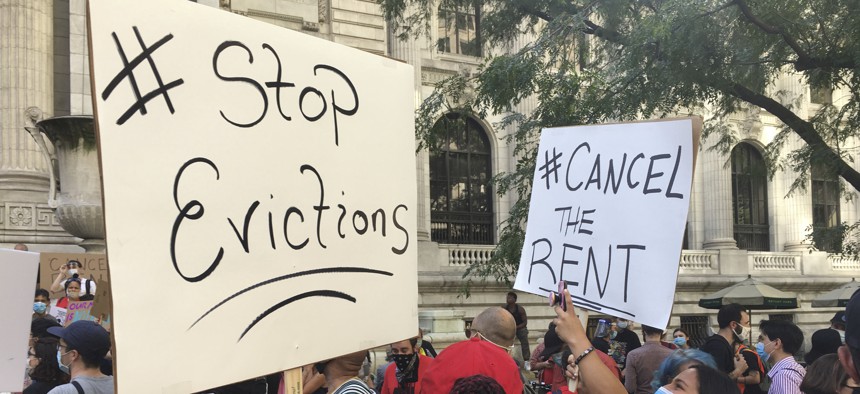New Federal Eviction Moratorium Covers Most Renters Through the End of the Year

A march for rent reiief in New York City. STRF/STAR MAX/IPx
But advocates for both renters and landlords say they want to see more financial assistance as the coronavirus-fueled recession continues.
Most renters who can’t afford to pay rent will be protected from eviction under an order issued by the Trump administration Tuesday, a move that comes as state and local bans imposed at the beginning of the pandemic are expiring.
Across the country, advocates for renters have warned about the increasing number of pending eviction cases in local courts against renters, including many who now owe back rent and fines.
The order, issued by the Centers for Disease Control and Prevention and the U.S. Department of Health and Human Services, is meant as a supplement to state and local bans, saying ones with tougher regulations will remain in place. It is a followup to the federal moratorium put in place for some renters by the CARES Act, which expired on July 24.
The new moratorium goes further than the one in the CARES Act, which only covered the 12.3 million renters who live in federally backed housing, about 28% of the nation’s 43 million renters. As the eviction bans expire and millions of people remain unemployed, advocacy organizations warned that without protections as many as 30 to 40 million renters would be at risk of eviction for failing to pay their rent.
“A wave of evictions on that scale would be unprecedented in modern times,” the order notes.
In addition to being unprecedented, it would also be dangerous, hampering critical efforts to reduce the spread of Covid-19. The order notes that state and local authorities will struggle to implement stay-at-home measures or social distancing directives if people are evicted and move into housing with family and friends or into homeless shelters, which risk becoming overcrowded.
National Low Income Housing Coalition President Diane Yentel said a national eviction ban was a necessary move that will provide relief for many families. But Yentel said it doesn’t go far enough, just pushing off when renters will be slammed with huge payments of back rent.
Congress and the Trump administration “must get back to work on negotiations to enact a COVID-19 relief bill with at least $100 billion in emergency rental assistance,” she said in a statement.
In order to gain the order’s protections, tenants will have to sign a form for their landlord testifying that they have “used best efforts” to pay on time and would likely become homeless should they be evicted. The protections only apply to tenants making less than $99,000 per year, or $198,000 if filing jointly. Tenants must also agree to make their best efforts to give landlords partial payments “as close to the full payment as the individual’s circumstances may permit.”
Tenants must further certify that they have used best efforts to obtain government assistance for rent—something that isn’t necessarily as easy as it sounds, as rental assistance funds have run dry in many cities. Renters in Houston, for example, claimed all of the $15 million assistance fund in just 90 minutes. House Democrats have proposed up to $100 billion in rental assistance, but like several coronavirus relief bills, the measure is still languishing in Congress.
Notably, the order does not cover people in hotels, motels, or other temporary housing situations. Renters who lost housing early in the pandemic and moved to motels have been frequent targets for evictions in many states, a trend that seems set to continue under the latest order.
The order does not cancel rent, nor does it prevent landlords from adding late fees or interest for missed payments. Landlords are still allowed to evict tenants for reasons other than non-payment of rent, and can require the full amount of all missed rent on December 31, 2020. Landlords may be subject to a fine up to $100,000 and a year in jail for violating the terms of the order—but the order is vague on enforcement, which is set to come from HHS and “cooperating state and local officials.”
The National Multifamily Housing Council, an association that represents landlords, agreed with renter advocates that the moratorium is missing several key measures. For the landlord organization, this includes not only rental assistance, but also protections for property owners like mortgage forbearance and relief from property taxes. Without these, the “stability of the entire rental housing sector is thrown into question,” Douglas Bibby, the association’s president, said in a statement.
“We are disappointed that the administration has chosen to enact a federal eviction moratorium without the existence of dedicated, long-term funding for rental and unemployment assistance,” he said, before adding that “renter protections are best left to state and local officials who better know their housing markets and can tailor protections to the varied and unique eviction laws and judicial processes across jurisdictions.”
Emma Coleman is the assistant editor for Route Fifty.






